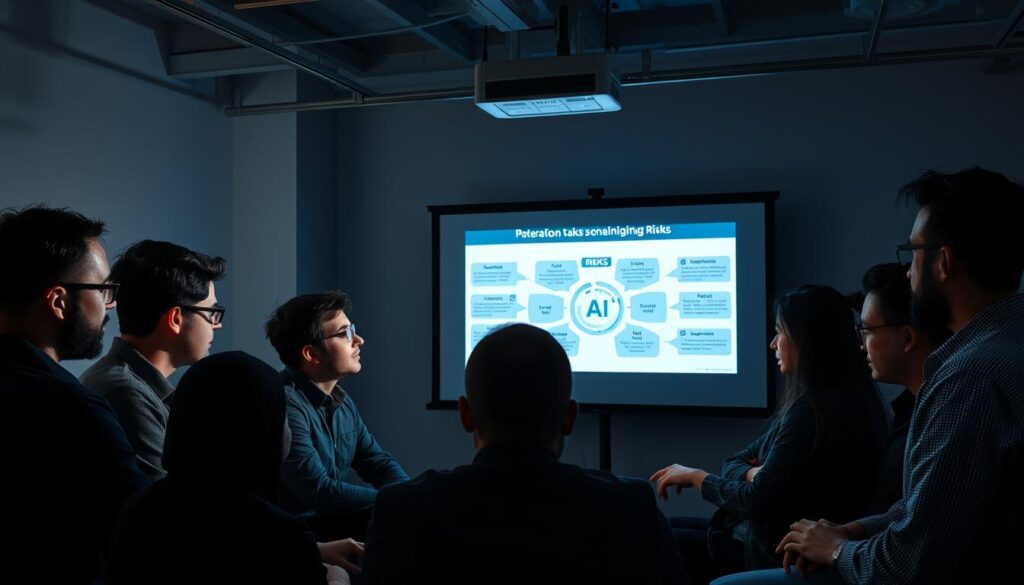Artificial Intelligence is changing businesses in the Philippines and Southeast Asia. But, have you thought about the hidden challenges it brings? As AI grows fast, it’s key to know the risks and manage them well. This ensures businesses stay legal and keep innovating.
We’ll look into the big deal of AI regulatory risks. We’ll see how companies can be ethical and follow the law as they grow. This is important in today’s fast-changing market.
Key Takeaways
- AI regulatory risks are essential for business sustainability.
- Effective Risk Management & Governance promotes compliance.
- Adhering to legal considerations fosters innovation.
- Understanding the regulatory landscape is vital for strategic planning.
- Governance frameworks guide ethical AI integration.
The Rise of AI in Business
Artificial intelligence is changing how businesses work in many areas. By early 2024, 72% of companies had started using AI, up 17% from the year before. This shows more businesses see AI as a way to make things better and more efficient, like in supply chains.
Companies are focusing on adding AI to their operations to get better results and serve customers better. For example, Grab and Gojek in Southeast Asia use AI to improve their services. AI has helped these companies make better decisions and work more smoothly.
But, adding AI to businesses can be tricky, and they must follow the rules. It’s important for companies to use AI responsibly. Studies show that knowing the risks and rules is key to using AI well. You can learn more about this at this resource.
Understanding Regulatory Risks
The world of artificial intelligence is always changing. This brings new regulatory risks that companies must handle. They face different types of risks when using AI. It’s important to know both local and global rules for staying compliant.
Types of Regulatory Risks
There are many regulatory risks for AI operations. These include:
- Data Risks: Problems with data privacy and security are big threats. Handling data wrong can cause big fines.
- Model Risks: AI models can be attacked, which can harm their trustworthiness. This can lead to unexpected results.
- Operational Risks: System failures and integration issues can disrupt business. They affect reliability and trust.
- Ethical/Legal Risks: Lack of transparency in algorithms can cause compliance issues. It raises questions about AI fairness.
Global Regulatory Landscape
Knowing the global AI rules is key for businesses using AI. The EU AI Act, set for 2026, shows how important following rules and using AI ethically is. Companies in the Philippines must follow local laws and also think about global standards. This helps build trust and keeps a good reputation.

Significance of AI Risk Management
Risk management in AI is crucial as more companies use these technologies. It helps identify and manage risks tied to AI. This way, businesses can keep their data safe, avoid breaches, and follow ethical standards.
By focusing on AI risk management, companies can avoid problems and improve their work. They can also meet legal requirements, which opens up new chances in places like the Philippines. Strong risk management helps businesses stand out, building trust with their partners and customers.
Key Elements of Effective Governance
Creating effective AI governance is key for companies to fully use artificial intelligence. Two main parts are crucial: transparency in AI and accountability. These help build trust and make sure companies follow rules. Using clear governance frameworks is also important.
Transparency and Accountability
Transparency in AI means being clear about how AI makes decisions. By sharing data and algorithm details, companies meet ethical standards. Accountability means having people or teams in charge of AI projects, which builds trust. It also helps fix any AI misuse issues.
Establishing Governance Frameworks
Organizations need to make detailed governance frameworks for AI. These include committees and rules for AI use. But, only a few companies have these in place, showing a need for better structures. By focusing on these frameworks, companies can follow rules and use AI ethically.

Risk Management & Governance for AI
In the Philippines, companies using AI need to manage risks well. A strong governance framework is key to handle AI risks. Clear policies and oversight help tackle challenges.
Strategies to Mitigate AI Risks
Managing AI risks means identifying and assessing risks. Here’s how to do it:
- Do risk assessments to find technical and operational weaknesses.
- Keep an eye on AI system performance and output.
- Have plans ready for AI-related incidents.
- Get stakeholders involved for better insights and transparency.
Training and Awareness
Training is crucial for a responsible AI culture. Employees need to know about AI risks, safety, and compliance. Here’s what training should include:
- Workshops on AI ethics.
- Training for real-world AI challenges.
- Updates on AI regulations and best practices.
By following these steps and training, companies can improve AI governance. This proactive approach ensures compliance and successful AI use in business.
Operational Risks in AI Adoption
Adding artificial intelligence to business operations comes with risks. Companies must watch out for data privacy issues. These are key because AI deals with sensitive information. Also, integrating AI systems can be tricky and may not work as expected.
Data Privacy and Security Concerns
AI systems handle a lot of data, making them a target for hackers. Businesses must protect this data and follow the law. If they don’t, they could lose customer trust and damage their reputation.
Integration Challenges
Putting AI into current systems can be hard. Old systems might not work with new AI. Also, data can get stuck in silos, making it hard for teams to share and use AI.

| Challenge | Description | Impact |
|---|---|---|
| Data Breaches | Unauthorized access to sensitive information | Loss of customer trust, legal penalties |
| Compatibility Issues | Difficulty in integrating new AI technology with existing systems | Operational inefficiencies, increased costs |
| Data Silos | Inaccessibility of data across teams or departments | Limited insights, hampered decision-making |
Managing Legal Considerations
Legal compliance in AI is key for businesses in today’s tech world. The EU AI Act and other regulations are changing the game. Companies must follow these rules to avoid legal trouble.
Compliance with Emerging Regulations
Keeping up with regulations is crucial today. New AI laws aim to make things clear and fair. They protect people and make sure companies act right.
Businesses need to watch for law changes and update their ways. Important areas include:
- Understanding local and international regulations
- Implementing data protection measures
- Maintaining documentation for audit purposes
Stakeholder Engagement
Talking to stakeholders is vital for AI. Hearing from users and experts helps companies understand and fix issues. This way, they can make better choices.
- Improved communication regarding AI impact and risks
- Collaborative approaches to solutions
- Incorporation of varied perspectives in policy development
By listening to stakeholders and following the law, companies can do well. They can also lead in responsible innovation.
| Regulatory Area | Key Compliance Requirements | Stakeholder Considerations |
|---|---|---|
| Data Privacy | Implement data protection protocols | Involve privacy advocates early |
| Algorithmic Transparency | Regularly disclose AI decision-making processes | Engage with users on AI ethical standards |
| Accountability | Establish clear lines of responsibility | Seek input from affected communities |
Global Trends in AI Regulation
The world of artificial intelligence (AI) is changing fast. This means companies need to update their plans. New AI rules will shape how businesses work. These rules focus on using AI ethically, being accountable, and keeping AI safe.
Upcoming Regulations
A big change is coming with the European Union’s AI Act. This law will set a standard for AI worldwide. It will guide how AI is made and used. Companies must watch how these rules will change their work and follow them.
Sector-Specific Regulations
There are also rules for specific areas like finance and healthcare. These rules are stricter because AI poses unique risks in these fields. It’s key for companies to know these rules to meet industry standards. Following these rules helps companies stay legal and build trust with the public.
| Region | Regulation | Focus Areas |
|---|---|---|
| Europe | EU AI Act | Ethics, Safety, Accountability |
| United States | Proposed Federal Guidelines | Transparency, Consumer Protection |
| Philippines | Draft AI Policies | Data Privacy, Local Adaptation |
| Asia | Sector-Specific Compliance (Finance, Healthcare) | Risk Mitigation, Security Standards |

Case Studies of AI Companies in Southeast Asia
Southeast Asia is becoming a hot spot for AI innovation. Many successful AI companies in the area show how AI can boost efficiency and growth. These AI case studies highlight how different industries have used technology to change for the better.
Companies have made AI solutions that fit local needs. This shows that making technology fit local needs is key to success.
Successful AI Implementation
A logistics company made a big leap by adding AI to its supply chain. It used predictive analytics to improve routes and cut down delivery times. This move saved it 20% on costs.
Another tech firm in finance used AI chatbots to better serve customers. This move made customer service more efficient and cut down on costs.
Challenges Faced
Even with success, AI deployment comes with challenges. Companies often struggle with regulatory issues, needing to understand legal rules. Integrating new AI systems with old ones can cause problems.
Data security is another big worry. Companies must protect sensitive info while using AI. Overcoming these hurdles is crucial for AI growth in Southeast Asia.
Conclusion
Understanding the risks of AI adoption is key. We’ve seen how important it is to have strong risk management and governance. These are crucial for businesses to smoothly integrate technology.
Proactive compliance is not just a safety net. It’s vital for building trust and growth in a changing market.
Businesses in Southeast Asia have special challenges. They must keep up with changing regulations. A flexible governance approach helps manage AI risks effectively.
Embracing ethical AI practices is not just a legal must. It’s also a way to stand out in the market.
Companies can lead their industries by balancing innovation with ethics. This approach meets the needs of all stakeholders.
In the end, the future of AI in business relies on ethical frameworks and strong governance. These are the keys to successful AI adoption.

